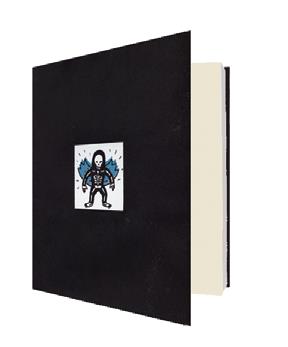Edward Bak has been a fringe drunkard and oddball on the small-press comics scene for years now. He’s the kind of guy whose name I knew, but I would’ve been hard-pressed to recall any of his actual comics. I saw his message-board posts and chuckled as he counted the days of sobriety and then suddenly stopped. My impression was that he was a charismatic waster at best. I couldn’t have been more incorrect, at least about the waster part.
Bak the cartoonist is possessed by his past. What we see are the inner musings of a man in his late twenties/early thirties, biding his time at his dishwashing job. He rehashes his history in straight narration, sometimes leaving little room for actual drawings. Then he’ll cover the same territory as a nearly wordless allegorical adventure comic featuring a “Lil” (as in “Lil Archie”) version of himself, a black cat spirit guide, and chattering demons. Then back to a political screed that blots out the drawings again.
Part of this comic’s beauty is that Bak printed a page a week in Flagpole magazine in Athens, Georgia, so you get the feeling that much of what you’re reading is off the cuff. The story is leading Bak, and he’s dredging up stuff from his past that surely surprises even him, but the result isn’t haphazard. Bak slowly builds to the heartbreaking sixteenth page, then leads us away quietly as we’re still reeling. He seesaws from exposition to a simple, beautiful image. Bak is the classic working-class philosopher— what else is there to do while you’re loading crates of glasses into the dishwasher?
At times, Bak chops up his page in a now classic Chris Ware–ian fashion—panel borders slice through the images separating the moments of time while giving us the full map of the kitchen or city street. Bak is no rigid formalist, though. He cares about the characters and is great with a gesture. On page 11, the casual dismissive handflip of a fellow service-industry professional is perfectly drawn. Bak the dishwasher stands agape as he realizes that the contract between his fellow wage slave is null and void when she’s in her civilian clothing. On page 2,we see a teenage Bak readying to smash a guitar against the wall in his room—and the image has all the youthful energy of that action.
The cover features a simple demon, his skeleton glowing through his skin. Inside, our protagonist chases a black cat who may or may not be his lost little sister. Bak throws symbols at us with vigor. He’s not ashamed of coming off as sentimental or strident—well, he might be a little ashamed, but he does it anyway. I’ve long thought that one of the best things about comics is that they don’t have to be about anything—they’ve got drawings and those drawings are the medium’s beautiful language. They can fill us in a way that doesn’t need plot or resolution. I know I wouldn’t want to read the anti-establishment rantings of many writers, but put them in the hands of a cartoonist as he buses tables and pilots a bathysphere through an underground grotto, and I’m right there with him. Bak avoids so many pitfalls of the memoirist just by leading an interesting life and paying attention while leading it.
Toward the end of the book, a character who just might be the author as an eight-year-old boy exclaims, “The artist… is a fucking fraud! He’s just a lousy dishwasher!” The artist is a dishwasher, but he’s no fraud.





